As I mentioned in my last blog, it’s been a busy month. Among other events, the semester started, and there was an enormous climate change march in Manhattan (paired with others globally) in anticipation of the United Nations special session on climate change. The actual United Nations session garnered commitments from each of the more than 100 world leaders in attendance to take action on climate change.
The new report on climate change focused on the idea that by converting some “externalities” into “internalities,” one can show that a carbon tax in some form or another could effectively mitigate climate change. The report also concluded that such efforts could both save money overall and accelerate economic growth, provided that the money from the tax were used to balance and reduce other taxes (see Eduardo Porter’s, “The Benefits of Easing Climate Change,” NYT September 23, 2014).
All of this has happened in the middle of what has seemed like the world catching fire. President Obama reflected on these situations in his address to the United Nations, a speech that was well summarized by the New York Times’ Mark Landler:
Even so, Mr. Obama said, the threat from the Islamic State was only the most urgent of an onslaught of global challenges that have given the United States no choice but to take the lead: from resisting Russia’s aggression against Ukraine to coordinating a response to the Ebola outbreak in West Africa; from brokering a new unity government in Afghanistan to organizing a new campaign to confront climate change.
The United Nations special session ended with a slew of commitments, which the UN Secretary General, Ban Ki-moon, later summarized. These included halving the loss of natural forests globally by 2030, palm oil producers aiming for zero net deforestation by 2020, a commitment by institutional investors to decarbonize 100 billion worth of investment by 2015 (see also Justin Gillis’s piece in the same September 23rd NYT publication), and the Insurance Industry’s commitment to double its “green” investments by the end of 2015.
All of these are in addition to commitments from large emitters like China and the US to work towards specific (lower) targets for emission of greenhouse gases.
As always on these issues, we will have to wait and see to what extent actions match intent. Toward the end of next year, there is a meeting scheduled in Paris, which is supposed to come out with a draft treaty to replace the Kyoto Protocol.
A day after the UN meeting I was invited to teach a class at a different school. The course was focused on global challenges and my talk was titled “Personalizing Global Challenges,” with a focus on climate change. Two of the faculty members and one of the students had participated in the march in New York City. During the class, my memory drifted back to the march; I have started to realize that perhaps the only way to democratize the future global changes we need – such as those needed to mitigate climate change – is to find a way for each of us to be able to personalize the issue.
Indeed, the march was incredibly successful in personalizing the issues. The march included meticulous organization, well-rehearsed chanted slogans and quite a few multi-use signs, but at the end, none of those were the real takeaway. Instead, there was a sense of recognition that this was a historic march that might really have an effect. Much of the focus seemed to be on having a good time, taking photographs of everything around you, and coming up with slogans and signs that highlighted significant and personal elements that need to change in order to modify our global behavior and prevent the dismantling of the planet that we all depend on.
I am including some of my own photos here for your enjoyment and you can find more in the links to the albums that I included in last week’s blog.
 On his own, with a big message: “Good Planets Are Hard to Find”
On his own, with a big message: “Good Planets Are Hard to Find”
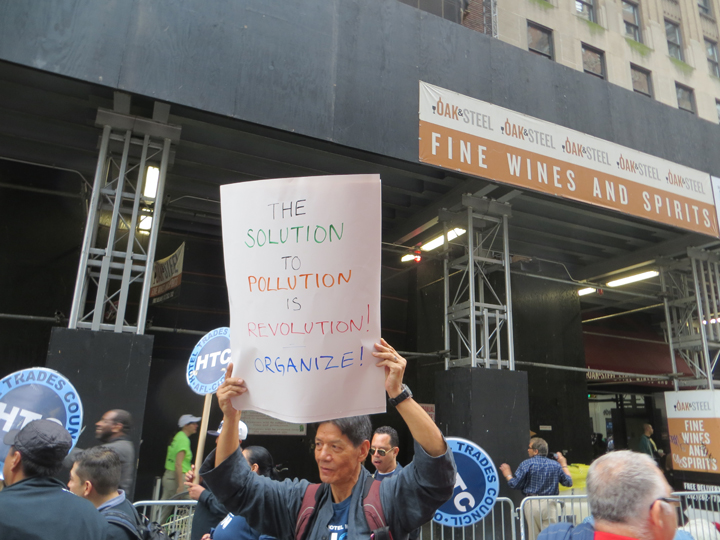 “The Solution to Pollution is Revolution – Organize” was a bit on the fringe but it rhymes.
“The Solution to Pollution is Revolution – Organize” was a bit on the fringe but it rhymes.
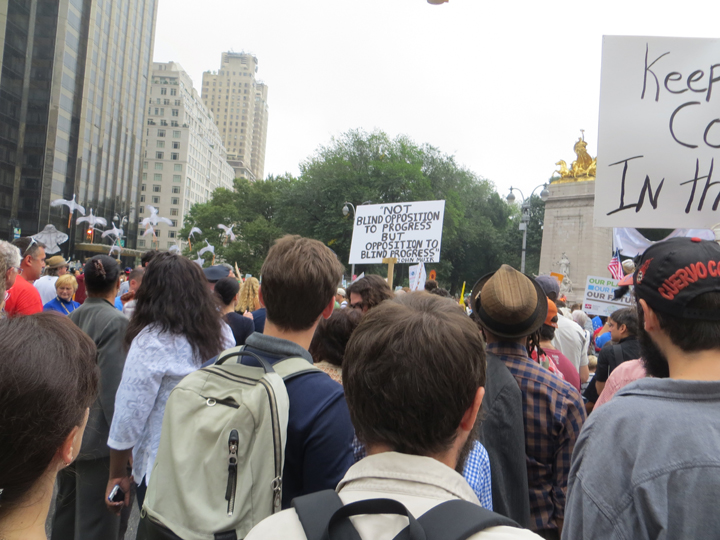 “Not Blind Opposition to Progress but Opposition to Blind Progress” Couldn’t have said it better, especially since it marched with the trade unions.
“Not Blind Opposition to Progress but Opposition to Blind Progress” Couldn’t have said it better, especially since it marched with the trade unions.
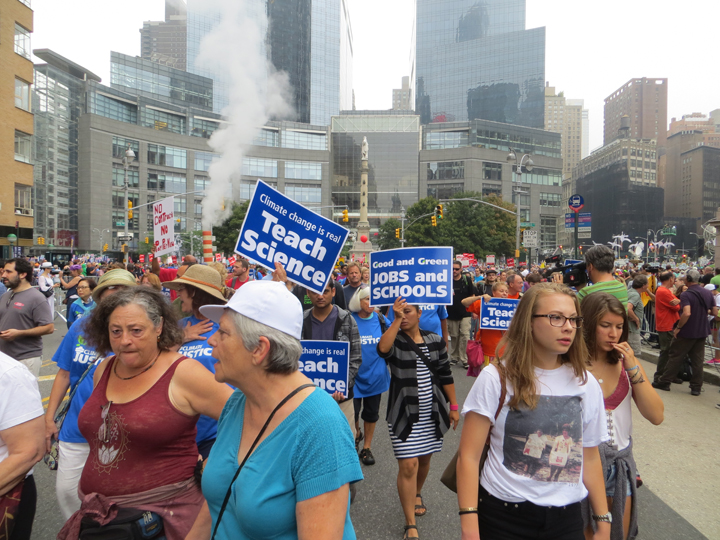 Science was at the center of the effort, and the emphasis on the need to “Teach Science” was everywhere.
Science was at the center of the effort, and the emphasis on the need to “Teach Science” was everywhere.
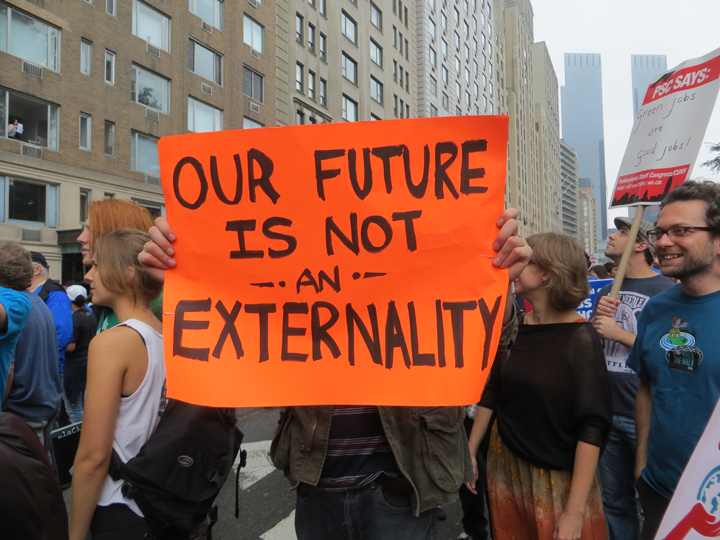 Directed at economists – In economics, an externality is the cost or benefit that affects a party who did not choose to incur that cost or benefit
Directed at economists – In economics, an externality is the cost or benefit that affects a party who did not choose to incur that cost or benefit
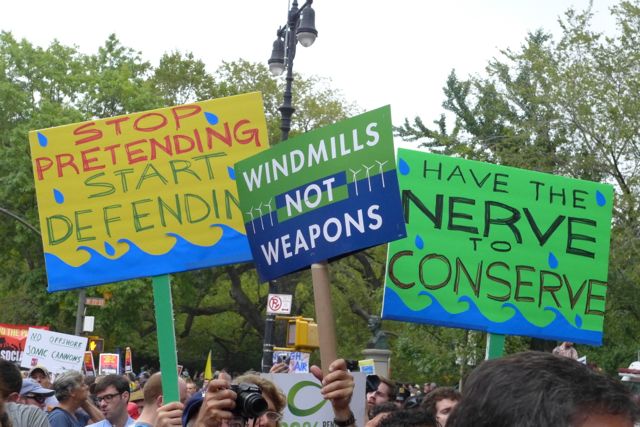 “Stop Pretending, Start defending,” “Windmills Not Weapons,” “Have the Nerve to Conserve.” (This photo, courtesy of my editor, Sonya Landau of LCG Communications)
“Stop Pretending, Start defending,” “Windmills Not Weapons,” “Have the Nerve to Conserve.” (This photo, courtesy of my editor, Sonya Landau of LCG Communications)

I was not able to attend the march but the professor organized a discussion in class on climate change. The speaker stated that it’s too late to do something to help with climate change. In my opinion it’s not too late to save the planet. It’s just whether or not people want to help fix it. If everyone helps out a little a big change can happen to help the environment.
Like many others, I participated in this march. It was extremely moving. At first when I heard about it, I thought it would just be about a couple hundred people protesting the climate change but the moment I arrived I realized that this was much more than that. In attending this massive event, I was able to get a better understanding of how severe this climate change problem is. At the event, I saw all different types of people. Men and women, blacks and whites, old and young, professional and students, and everyone in between. At the march, I saw people dressed as polar bears representing the effects of climate change on animals in the cold. Ice caps are melting causing extinction on animals like Polar Bears. Also, at the march everywhere you looked, you saw signs. These signs were real eye openers. These signs said things such as “NO FRACKING,” “March to save our world,” “Be the change you wish to see in the world,” etc. At this march I was really moved by the passion in the people marching. The way the climate is changing is a serious problem. While me may not see the real effects of it, and neither will our children, but our grandchildren will definitely see the damage we’ve done. By going to the march I was able to understand that if I want the future generations of my family to live in a somewhat safe world, I have to change how I live. This Climate march was a world changing experience that will go down in history because of its huge success.
I didn’t attend the climate change march but we have in class discussion. In my class, one of our students creates the argument about political issue of climate change. He discuss about pipeline that connect with Canada to Texas. In past, president Obama discusses issue of reducing CO2 emission. It stated that reducing 30% of CO2 emission will be met in the year 2030. As for the pipeline issue, Congress and other Senate officials rejects the pipeline construction. The original cost of keystone pipeline is about 5.2 billion dollars but extension will be estimate to 7 billion dollars. This cost will affect middle class to pay more money. There is also environment issue with the keystone pipeline. The main focus issue is oil leak out. The keystone pipeline needs to pass through high sanative terrain. Also, within it, the problem is about 17% higher of greenhouse gases that takes out of the oil sand than in comparison to that taken out oil.
More and more problem comes from the Keystone pipeline if to be created. The situation is effect wildlife, water supply, and effect ecosystem. Keystone pipeline need to pass through Nebraska large wasteland. As Ogallala Aquifer (water supply) is one of fresh water in world support eight states and also provide drinking to over 2 million people. Therefore, is support 20 billion dollars to agriculture. If the pipeline leak out oil, it will cause damage to millions of people that need those environment. Keystone pipeline is passing down to earthquake that can cause damage to pipeline.
Result to this entire problem is that state need to think about plan of creates safe method for the environment.
Unfortunately, I was not able to attend this march but we had a collective discussion in class. Two of my classmates who did attend spoke to the class on their views and opinion on this topic. The first student who stated in his presentation that ” environmental issues are beyond our control,” elaborated on the government’s role in this issue. I agree with the question of what is our government doing to resolve this issue. Former Governor Al Gore went about on his own to speak to “the people” about fact that he discovered during his research on Global Warming. He took necessary trips to China and Japan to try to show data on what is happening to the world. Especially with the glazers melting in our Northern Hemisphere. But is he the only politician worried about the effect of climate change. As the second student shared her beliefs and views on climate change, I began to realize that the world may never have one overall agreement on “who is responsible for global warming.” Everyone has their own beliefs and opinions on the cause and affect of this. Maybe it will be too late to make a change. But for now, we should all start educating ourselves by attending Marches, going to meeting, taking classes or even reading articles from Scientist like Professor Tomkiewicz to see what is truly going on in the world.
I was not able to participate in the march but their were two of my classmates who did go. The professor ask them to have a discussion with the class based on what it was like to attend the such an important event. They both have pretty interesting views but the thing that stick out to me during discussions, was that they their small change really won’t have much of an impact. I thought that that was an negative way to look at something, which so important to our very existence. If our weather continue in the direction that its going it will not be good for our futures. But still and all they both agreed that they were very proud of that small difference they made by attending the event. Hopefully they motivated and inspired others to attend next year’s march, I know will be sure to go next year.
I couldn’t participate in the march but i did participate in the class discussion of climate change about what should be done. As i listened to the two speakers that are ok with climate change and are not willing to help the cause to save the planet earth, i was astonished with the selfishness that they presented. their excuse was “theres nothing i can do” or ” its already happening what can i do”?. its just amazing how because their not effected in a big way they don’t care. the rich people on the other hand are still willing to spend money to get oil through pipes that comes from the north and are not worried if it blows up under ground and cause a major disaster. its hard to try and change the world with people like that that are selfish or money hungry. for us to change anything we all or the majority have to work together to fix the climate change problem.
It was the first time ever I participated in such a massive event about Climate Change problem. I was shocked by the amount of people participating in it. There were not only young groups or only mature, but all different ages. When we came, because of the large amount of people we could not find our CUNY group, but soon we realized that it is really does not matter because everyone there was with the same purpose. I brought my friend with me who is very skeptical about climate change, but at the end he was so amazed by this event, that he ended up even enjoying it. What also surprised me, is that different organizations and unions were actively involved in the march. They all had different slogans and were very excited to participate in such an event. Each group was prepared and had something that distinguished them from other groups, such as t-shirts, posters, bracelets or stickers. I did not see any people in the suits and it was obvious that those who participated were low and middle class workers- those who really care about our planet and not just money. When we got to the place, we saw tables that gave out posters and t-shirts for free. I felt like if I participate in this event, I should be as much involved as possible, so we took posters and joined the march. It was pretty exciting to be part of it and see people passing by and looking at us curiously (some viewers had no idea about the march). We walked for a while and got tired, so decided to stop to eat. When we walked out after 30 minutes people still were marching by! This is how massive the event was! As I know, this march becomes bigger and bigger each year. After I saw it in the news, I felt proud that I was part of it and part of the history it creates. This march, obviously, will not stop pollution or climate change right away. But what it does, it brings up the problem, makes people think about it and shows that there are those who care. What was my surprise, when on Halloween march among vampires, zombies and witches, I saw somebody caring a huge sign saying, “No fracking! Stop climate change!”
As always, I welcome your comments. Let me know what you think!
Thanks,
Micha